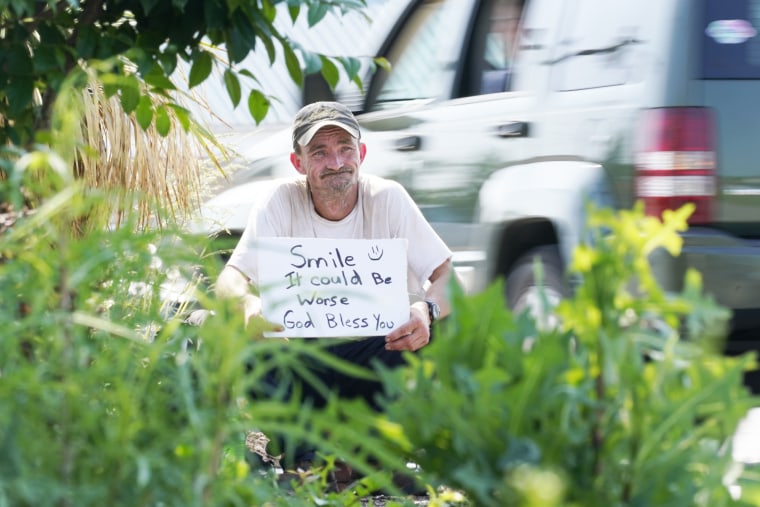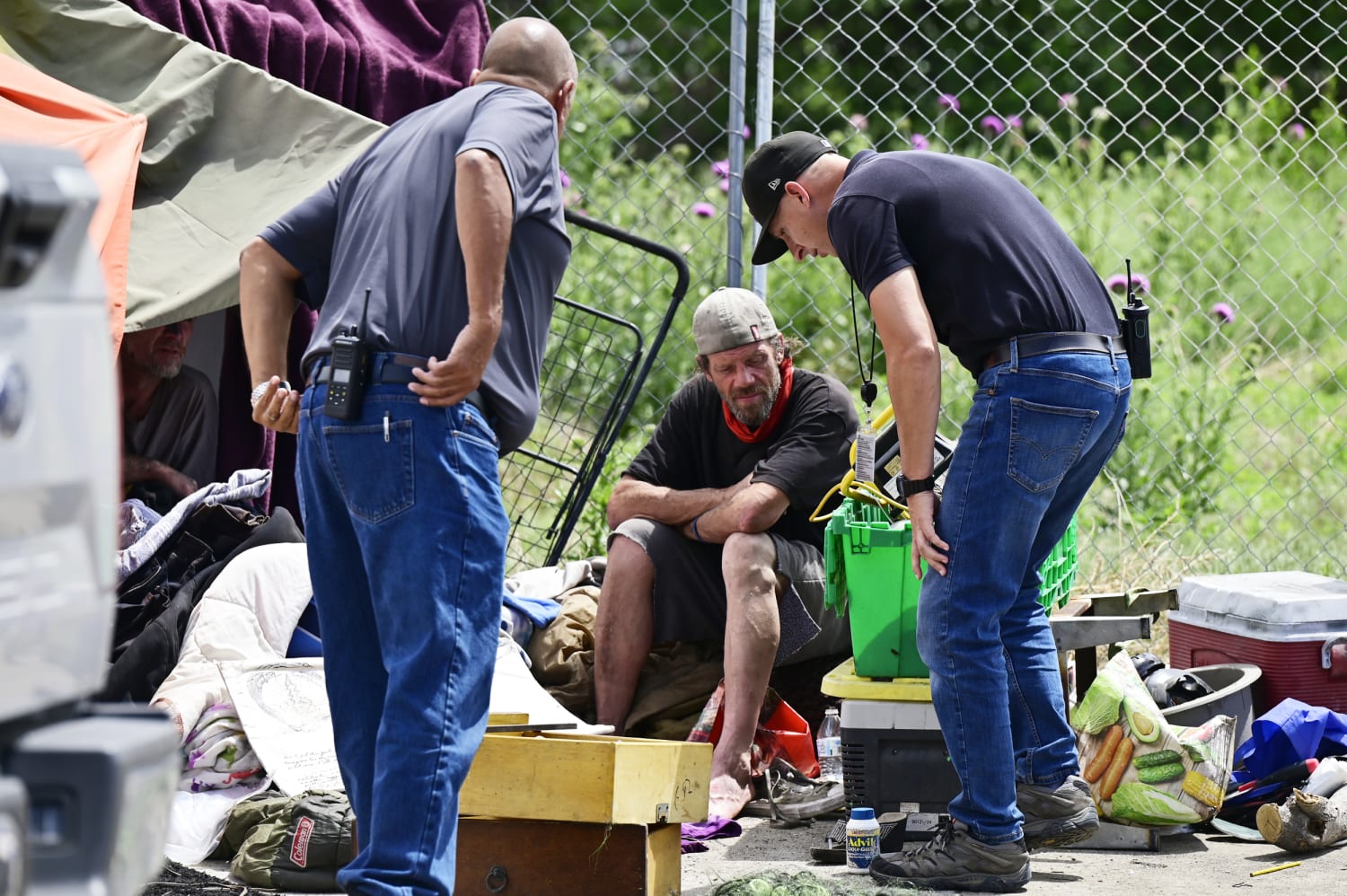Many state governments are experimenting with legislative approaches to address homeless populations, particularly in their largest urban areas, that spiked during the pandemic.
Tennessee and Colorado offer competing — and divergent — solutions.
The main metropolitan areas in both states — Nashville and Denver — have, in recent years, like most other major cities, seen dramatic rises in housing costs and a dearth of affordable alternatives that have pushed out low-income people. Denver, for example, trailed only New York and Los Angeles in its number of people experiencing sheltered homelessness, according the latest federal data. The livelihood of many who had already been living on the edge was irreversibly scrambled by the onset of the pandemic in 2020, and the recent surge in inflation has only compounded their ability to keep up with the cost of basic goods.
As a result, an increasing number of people and families have taken up to the streets, triggering a range of responses.
In Tennessee, a law enacted by the Republican Legislature that goes into effect July 1 makes it a felony for homeless people to camp in parks and on other public property — a measure advocates say is “unprecedented.” In Colorado, meanwhile, Democratic Gov. Jared Polis recently signed into law two bills creating campuses where people can get help in their transition out of homelessness by supplying housing, mental health services and job training.
“We tend to see communities reacting to all of that in one of two ways. One is with empathy and concern for their fellow citizens and residents who are losing their housing, while the other is to pretend that it’s their fault that they’re becoming homeless and to use the criminal justice and legal systems to deter behavior they think is bad,” said Eric Tars, the legal director at the National Homeless Law Center, a nonpartisan nonprofit advocating for housing rights.

While homelessness across the U.S. decreased modestly in 2021, according to government data, experts like Tars note the numbers were likely undercounted due to delays and other impacts of the pandemic. A disproportionate amount of people experiencing homelessness are people of color. The problem remains particularly robust in major cities: according to the U.S Department of Housing and Urban Development’s latest Annual Homeless Assessment Report, more than half of all people experiencing sheltered homelessness in 2021 were in one of the largest 50 cities.
Because homelessness exists predominantly in urban areas, tackling the issue has fallen mostly on city governments. But during the pandemic, many cities suspended or refused to enforce measures already on the books prohibiting homeless encampments. As the pandemic has ebbed, cities have resumed taking them down, and state governments have become increasingly active in taking steps to curb homelessness — though the approaches in doing so have differed widely.
Tennessee’s law, for example, effectively makes it a felony crime to camp overnight in parks, on highways and under overpasses. Doing so will be punishable by up to six years in prison, with a felony conviction resulting in the revocation of one’s voting rights.
Tennessee Gov. Bill Lee, a Republican, let the bill become law without his signature last month, warning it would likely result in “unintended consequences,” though he refused to veto it.
Nashville’s Metro Development and Housing Agency found that 1,916 people were experiencing homelessness in the city, the largest in Tennessee, during its point-in-time survey this year, a five percent decrease since 2020. The latest federal data found that 3,443 people in Tennessee were experiencing sheltered homelessness.

Homeless advocates say the bill is unprecedented as to the extent to which it criminalizes homelessness. Many point to several bills that subject homeless people who camp on public areas to misdemeanor charges, but none were able to identify any laws that threatened felony charges, which they say have the potential to further destroy lives with prison time.
“It does nothing to end homeless. It, in fact, just exacerbates the issue. From what we can tell, it’s unprecedented. It’s making a situation that isn’t the person’s fault into something that results in lifelong consequences,” said Donald Whitehead, the executive director of the National Coalition for the Homeless, a nonpartisan advocacy group. “When people have felonies on their records, they’re not able to access subsidized housing, they’re not eligible for certain jobs. It can make a situation that is already very bad and not the person’s fault even more of a barrier.”
Tars, of the National Homeless Law Center, highlighted data showing that, in any state in the country, it is not possible for anybody working a minimum-wage job 40 hours a week to afford a two-bedroom apartment — a trend made worse by inflation and the lingering impacts of the pandemic.
“They want to use that system to deter the behavior of camping, which they feel is negative behavior, but the root cause is that people need somewhere to sleep at night, and you can’t deter that behavior,” he said.
The Tennessee bill’s lead sponsors, state Sen. Paul Bailey and Rep. Ryan Williams, who both represent largely rural districts, did not respond to phone calls and emails from NBC News for this article. Gov. Lee’s communications director did not respond to phone calls and emails either.
Other states have also attempted to criminalize homelessness in recent years. A review by the Pew Charitable Trusts’s Stateline outlet unearthed nine bills introduced in six states over the past two years that ban permanent homeless encampments, penalize cities and municipalities who don’t enforce laws to remove them, and make it a misdemeanor — punishable in some cases by fines up to $5,000 and a month in jail — to sleep on most public property.
Despite the recent wave of action from states, it has been city governments who have typically been left to address homelessness and the surge of encampments.
For example, in New York City — where some advocates say homelessness is at its highest levels since the Great Depression era — Mayor Eric Adams has swept parts of the city of encampments and increased policing to prevent homeless people from sleeping on the subways. Officials in Los Angeles have done the same. Whitehead’s group estimates that 65 cities, counties or municipalities now have laws on the books criminalizing or mandating the systematic removal of homeless camps.
In Colorado, officials have taken a different approach. Last week, the state’s Democratic governor signed a pair of bills allocating nearly $100 million to create two campuses designed to help people transition out of homelessness.
Using grant money from the American Rescue Plan Act, one bill devotes $45 million to repurpose and redesign a closed juvenile facility campus 30 miles southeast of the city into a “supportive residential community for people experiencing homelessness” featuring transitional housing, mental and behavioral health services and treatment, medical care and job training services. A second bill, also paid for by ARPA money, funds a $50 million grant program to build a second campus.
“There is a deep-seeded belief among many of us that we as a state have to uphold the belief that housing is a human right,” said state Rep. Iman Jodeh, a lead sponsor of the second bill. “In Colorado, even if you’re not homeless, there is a good chance there is an encampment very near you.”
The number of people who experienced homelessness for the first time in the greater Denver area doubled in 2021, with 32,233 individuals having accessed services related to homelessness between July 1, 2020 and June 30, 2021, according to the Metro Denver Homeless Initiative. About 13,000 lived in unsheltered conditions outdoors during a point during that time.
Many other states and cities have used some of their ARPA money to address homelessness — though not to the extent Colorado has — including California, which pours billions into fighting homelessness each year but has little to show for it.
Jodeh, who represents parts of the Denver suburbs, acknowledged lawmakers would not have been able to enact such sweeping measures without federal money, but that tackling homelessness more comprehensively was a top policy priority for the Democratic-controlled Legislature and the governor, even before the funds were made available.
“It has been an issue here for a while, and with rising housing costs and Covid, and our lack of attention to mental health, it was spiraling,” she said. “Colorado identified addressing homelessness as a top priority when it came to our ARPA funding, and as such, we really wanted to do something innovative for our state that wasn’t just a Band-Aid.”
Jodeh acknowledged that states must do much more to combat the issue — but that doing so without a flush infusion of federal dollars is a heavy lift.
At the very least, however, she added, states shouldn’t criminalize the behavior.
“Those kinds of ideas paint such a broad brushstroke on an issue that is so multifaceted,” she said. “That kind of response, to criminalize, is not a turnkey solution.”
Source: | This article originally belongs to Nbcnews.com










